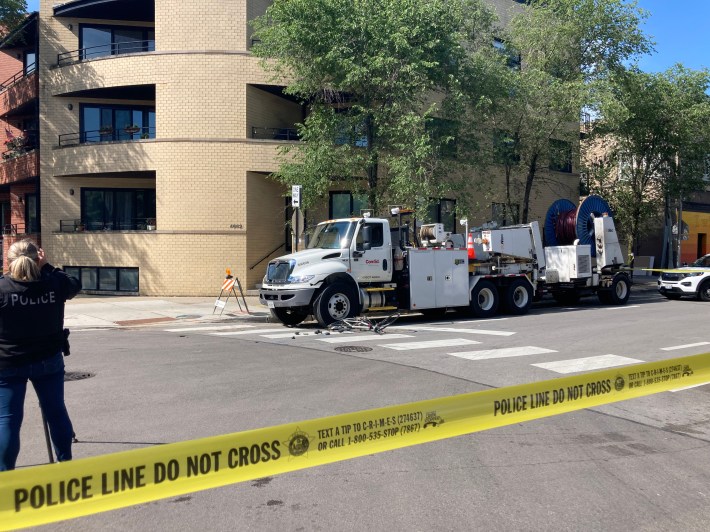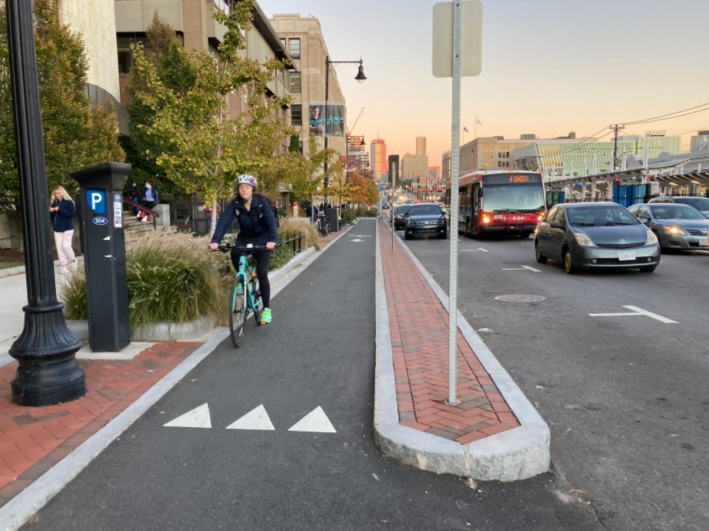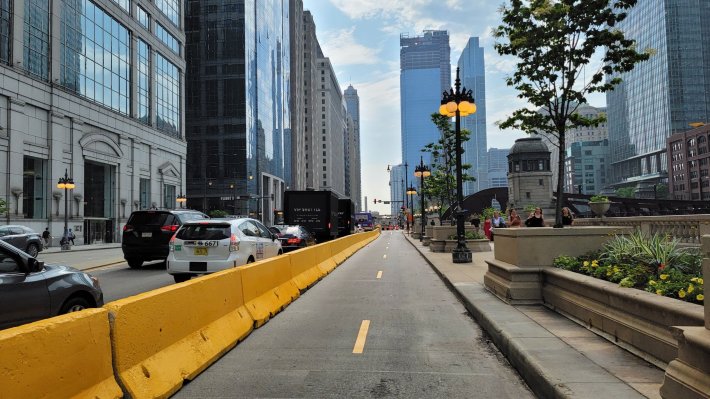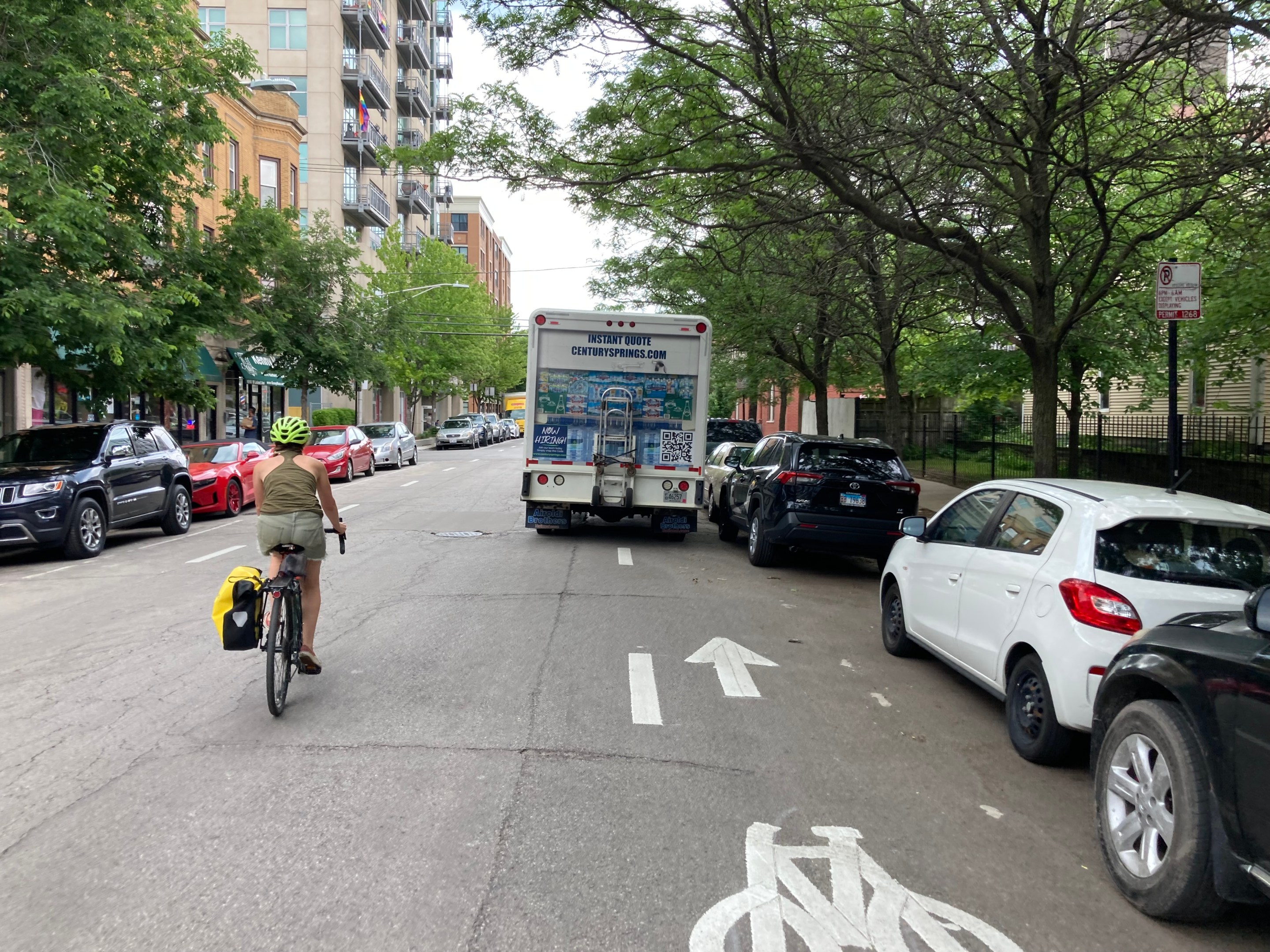Update 6/15/22, 3:20 PM: As we reported earlier today, 1st ward alderperson Daniel LaSpata tweeted this morning that Chicago Department of Transportation commissioner Gia Biagi told him if residents fill out a 311 request regarding an incident of illegal parking in a bike lane, including images of the violation and the vehicle's license plates, the 311 requests "will be sent directly to Administrative Hearings for tickets."

Unfortunately, when we tried to confirm this information with CDOT, the department provided a statement saying this is not actually the case. "CDOT is committed to protecting our residents and visitors who use bikes lines to get around our city. We continue to engage with aldermen and other stakeholders about ways to use 311 to enforce bike lane obstructions and parking violations. Requests sent to 311 are not sent to Administrative Hearings for ticketing. [Emphasis added.]"
"If individuals see someone illegally parked in or obstructing a bike lane, CDOT encourages residents to send the information to 311. This information is used by the city to guide enforcement and identify hotspots to improve public safety," the CDOT statement concluded.
Streetsblog reached out to LaSpata about CDOT's statement, he said, "We'll be making a statement shortly through the office." We'll update this post once the alderperson releases the statement.
Drivers illegally parking in bike lanes has long been a problem in Chicago, because it forces people on bicycles to leave the bikeway and merge into the mixed-traffic lane. That puts them at risk of being struck by other motorists, especially if they're inexperienced riders, not used to looking over their left shoulder and behind themselves for oncoming traffic. It's a major reason why most "normal" Chicagoans (as opposed to bike enthusiasts) don't feel comfortable riding on city streets.
It's a big enough issue that the Bike Lane Uprising website for reporting bike lane parking violations was launched here, soon spreading to many other cities. As a sign of what a big problem bikeway obstructions are, BLU surpassed 15,000 followers on Twitter yesterday.
Tragically, bike lane blockage became a front page news story last Thursday in Chicago. That morning a ComEd worker illegally parked his truck in a bike lane on Leland Avenue in Uptown. As the mother of Lily Shambrook, 3, was cycling on Leland with the girl in a child seat, the mother was forced to leave the bikeway. Then a Mondelez semi driver overtook the woman at the stoplight, squeezing her between the two trucks and then clipping her. She fell, and the semi driver ran over and killed the toddler. On Sunday hundreds of people showed up for the Walk + Roll for Safe Streets protest, which ended at Lily's crash site.

In the wake of this preventable death, on Monday the Chicago Sun-Times ran an editorial suggesting that the consider raising the fine for illegally driving, standing, or parking in a bike lane from the current $150. "Maybe the ComEd driver, who was issued a pair of parking tickets after Lily Grace was killed, would have thought twice about where to leave the truck if the fine was higher."
Ultimately, Chicago should make driving and parking in bikeways a non-issue by making bike lanes with robust physical protection, not just paint and/or flimsy plastic posts, the standard. Another effective approach would be to build bikeways that are raised above the street level, so that it's nearly impossible for drivers to misuse them, but an inch or two below the sidewalk, so pedestrians don't walk in them.

There was an encouraging sign on that front Monday, when CDOT used portable concrete Jersey wall sections to protect a one-block bike detour on Wacker Drive between Clark Street and Dearborn Street, where the existing protected lane is closed north of Wacker due to bridge work. This type of safer, quick, cheap, parking-proof bikeway treatment is a strategy Streetsblog Chicago has long advocated for, which downtown alderperson Brendan Reilly recently expressed interest in trying. Ironically, the temporary two-way protected bike lane on Wacker, which involved converting one of the seven (!) mixed-traffic lanes on the drive to dedicated cycling space, is just about the safest on-street bikeway ever built in Chicago.

This morning there was more good news about keeping bike lanes clear. 1st Ward alderperson Daniel LaSpata, a frequent bike commuter himself, tweeted in a thread this morning that Chicagoans can hold bikeway blockers accountable by creating a 311 service request that includes photos of the vehicle obstructing the lane, and its license plates.
"My office has been investigating the best way to submit Bike Lane Parking Violations for enforcement to the city of Chicago," LaSpata said. "Here is the best way to submit violations for ticketing:"
(1) Use the "Vehicle Parked in Bike Lane Complaint"(2) Select the specific time for the violation(3) Include a photo of the front and rear license plate to document violation(4) Submit your request!
— Alderman Daniel La Spata (@AldermanLaSpata) June 15, 2022
The alder said Chicago Department of Transportation chief Gia Biagi confirmed to him that 311 requests about bike lane blockers that include photo documentation of the foul and the plates will be sent to the Administrative Hearings for tickets. "My office wants to help: send your SRs to zoning@the1stward.com for my staff to follow up," LaSpata tweeted.
We've asked CDOT for confirmation that LaSpata's thread is accurate and will update this post if we hear back from the department.
A very similar approach to cracking down on bike lane scofflaws was proposed in New York City last year. When I asked if this is currently a thing in the Big Apple, Streetsblog NYC editor Gersh Kuntzman replied, "Nope. Not possible…yet. Only with taxis can members of the public send in pictures and get discipline."




